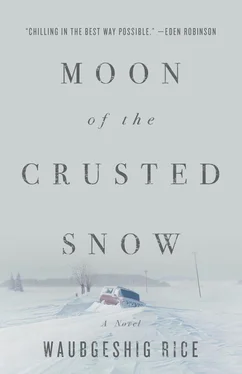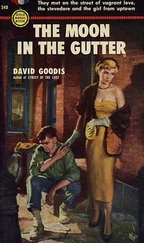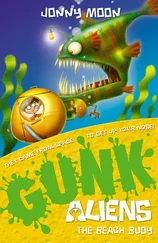“Then out of the blue someone threw a big rock through one of the front windows. It smashed and glass went everywhere. One guy ran up through the crowd and just heaved a garbage can right through the big window.” He took a deep breath and cracked open his own water bottle, and Kevin picked the story up again. Beside him, Joanne stared at her son, her eyes fixed with worry.
“The crowd rushed into the grocery store, elbowing and shoving others out of the way. It looked like some people were getting cut on the glass because there was blood everywhere all of a sudden. Some of them were getting in fights and punching each other. We decided to get out of there.
“We ran all the way back to the residence. We decided not to tell anyone what we’d seen because we didn’t want to freak them out any more than they already were. We went back to my room, and that’s when we started to figure out how to get back here.”
“There was a big storm later that day too,” said Nick. “We knew we had to get our shit together pretty quick.”
Evan looked up at the ceiling and tried to align his own memories of the recent weeks with what he was hearing. He admired their bravery and ability to make it back home. Not long ago, he’d considered them just typical teenage boys.
Kevin and Nick explained their plan to leave the mayhem in the city. Finding their way out of town and heading north was easy, they said. Both had a fairly accurate idea of the way home. And if they did get lost, they’d just try to find the hydro line and take the service road. But securing snowmobiles would be hard.
They knew where the dealerships were. Most people who owned a snowmobile on the rez had bought it from a place in Gibson. They would be locked and shuttered, maybe even abandoned by now. Floor models wouldn’t do them any good anyway. They’d have to find machines that were already in use, hopefully with some gas in their tanks, since the pumps were out of service everywhere.
They’d have to siphon whatever was left in the vehicles they could find. They also needed cans to hold the gas. “The more we thought about this plan,” Kevin said, “the more frustrated we got. But the people who were still left in our building were literally going crazy. Some were crying all night. Some were fighting. We had to get outta there.”
They decided to pack their bags with as many clothes as possible. They put their essentials in the hockey bags and stashed the sandwiches they’d been saving deep within sweaters and jeans. The bread was growing stale but the meat was holding up because their rooms were so cold. It was the only food they’d have.
“Over the next couple of days, things got worse,” said Kevin. “We were left on our own in the residence. No one from the college came by anymore. All the bottled water they left us ran out. There was no food anywhere. We sort of kept to ourselves and didn’t really talk to anyone. Nobody had really talked to us much in the first place before this all happened anyway. There were fewer kids in the hallways every day. I dunno if they left town, or if something bad happened to them. But we couldn’t wait around and worry.
“Security was gone. The front door’s lock was broken. Anyone could come and go. I was worried there would be desperate and hungry people coming in, looking for food or shelter or anything. It was freezing. So we left our bags in our room and went to try to figure out our shit. We hid little emergency flashlights in our pockets.”
Nick said they went into the campus buildings to explore. The doors were smashed open and small groups of people huddled in the corners of the foyer and in rooms off the large hallway, trying to stay warm. “They were begging us for food,” his voice broke as he remembered. “Some of them looked real sick. It must have been about a week since the blackout started by that point. We couldn’t help them.”
“I told Nick we should go down to the shop wing. No one goes down there unless they have class. I thought we might be able to get some tools and stuff. And that’s when I remembered that’s where all the maintenance vehicles were kept. I thought there might even be something in the shops we could use. So we started running a bit. We looked around to make sure no one was following us. We turned down the wing, trying all the doors and they were all locked.
“We stopped in front of the door of the small-engine shop and waited a couple minutes, to make sure no one was behind us. And then I kicked it open.”
“We turned on our flashlights, and I couldn’t believe it,” added Kevin. “It looked like no one had been in there since the power went out. Either the teacher forgot about it or just didn’t care. But there were two snowmobiles in the middle of the shop. They looked pretty new, and they weren’t in pieces, waiting to get fixed. I went to the hall to keep six, while Nick tried them out.”
The keys were still in the ignition. Nick turned one and pulled the cord to start it. The engine revved to life. He killed it immediately, and they waited a long time before trying the other one, not wanting to attract attention. The second machine worked. Then they waited, again. Neither knew how much time they allowed to pass in the shop, but they didn’t want to risk being heard or spotted, especially since they may have found their way out of the city.
Nick told them that a final scan of the shop yielded four full Jerry cans of gas in a back corner. “We didn’t know if it was still any good,” said Kevin, “but it was a good sign, anyways.”
They left quietly through a back entrance to avoid the needy students.
“The snow was pretty deep by then,” he said. “We propped the door open with a screwdriver we pocketed from the shop. We walked all the way back around to the front, tight to the side of the building, so that we wouldn’t leave any footprints in the snow.”
Nick squeezed his empty water bottle, crunching the plastic. When they got back to the residence building, they heard a commotion in the cafeteria as hungry students tore through the kitchen. They made for the stairs and went up to Kevin’s room, where they waited out the daylight. They’d been sleeping in the same room for days by that point.
In the middle of the night they heard screams. A woman was shouting something neither of them could make out. They did their best to ignore the havoc, even as fists pounded on the door of the room where they hid. “We didn’t make any noise,” Kevin spoke softly. “We hoped they would think our room was empty.” Even in the darkness, they were paranoid about the others seeing their packed bags or any other hints of their impending escape. They didn’t sleep.
After what seemed like hours, they opened the door and cautiously carried nearly full hockey bags of clothes, food, and supplies downstairs and out the side door. They were still unsure of how they’d transport their gear with the snowmobiles, but they figured it was safer to stash their gear by the machines now, instead of scrambling for sleds or other towing implements in the heat of escape with big hockey bags on their backs.
They slipped through the frigid early morning, a half moon lighting their way. “We moved quick because of that,” he added. They took the same route back and were relieved to find the door still propped open. They said they ditched their hockey bags, closed the door, and made their way back to Kevin’s room. Everything was as silent as when they’d left.
“We slept for a couple hours, I guess, and then got woken up by voices outside in the hall,” said Nick.
“That’s when shit really started to get crazy.” Kevin picked up the story again. “I opened the door and a whole bunch of people were crowded at the end of the hall. They were looking in one guy’s room. His name was Dylan. I guess he got sick and died. Someone said he was diabetic. Someone else said he mighta OD’d. No one knew what happened to him.
Читать дальше












